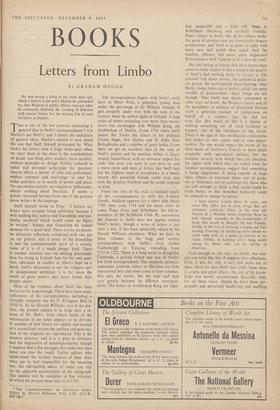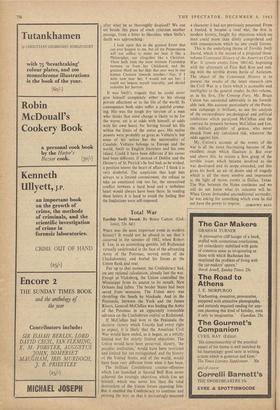BOOKS
Letters from Limbo
By GRAHAM HOUGH
He was saying a thing to me some days ago, which I believe is the great Maxim he proceeded by; that Wisdom in public Affairs, was not what he commonly believed, the forming of Schemes with remote Views; but the making Use of such Incidents as happen.
rr HIS is one of the few remarks expressing a I general idea in Swift's correspondence;* it is Harley's not Swift's, and it denies the usefulness of general ideas. Harley's maxim is very much the one that Swift himself proceeded by. What makes his letters such a huge choke-pear when we meet them in the mass is the accumulation of detail; one thing after another, mere incident, without principle or design. Politics reduced to cabal and personal jockeyings for position; church affairs a matter of jobs and preferment; endless journeys and scurryings to and fro, either pointless or in search of power and place. No speculative activity, no religion or philosophy, almost nothing about literature. It seems a grimly restricted harvest from one of the greatest prose writers in the language.
Swift himself wrote to Pope : 'I believe my letters have escaped being published because I writ nothing but nature and friendship, and par- ticular incidents which would make no figure in writing.' Nature and friendship do indeed account for a good deal. There are no set-pieces, no elaborate reflections composed with one eye on the printer; and if some of the friendship is just the companionable spirit of a coterie, some of it is of a much deeper kind. There is another constant too—an abiding discontent; hate for living in Ireland, hate for his own posi- tion, affections in conflict or always kept on a leash. Swift's discontent is not the vulgarer sort of disappointed ambition; it is far more the result of great powers that never found their proper object.
Most of the evidence about Swift has been before us for long enough. There have been many collections of his correspondence including a virtually complete one by F. Elrington Ball in 1910-14. As Sir Harold Williams says in his pre- face, the present edition is in large part a re- issue of Dr. Ball's, from which much of the information in the notes appears to be derived. A number of new letters are added, and instead of a normalised version the spelling and punctua- tion of the originals are reproduced. This is the modern practice, and it is a gain in vividness and the impression of contemporaneity; though I suppose that a few passages that make less than sense are also the result. Earlier editors who modernised the surface features of their texts were apt to feel responsible' for the meaning too; the old-spelling editor of today can rely on the apparent eccentricities of the autograph. The edition will be complete in five volumes, of which the present three take us to 1731.
* THE CORRESPONDENCE OF JONATHAN SWIFT. Edited by Harold Williams. Vols. I-Ill. (O.U.P., £10 10s.)
The correspondence begins with Swift's early days at Moor Park, a penniless young man under the patronage of Sir William Temple. It gets properly under way with the turn of the century when he settled again in Ireland. A long series of letters extending over more than twenty years was exchanged with William King, the Archbishop of Dublin. From 1710 when Swift joined the Tories the letters to his political friends begin, first Harley and St. John, later Bolingbroke and a number of great ladies. From these we get an excellent idea of the tone of Swift's society and his position within it. Enor- mously hierarchical, with an immense respect for rank—but once you were in you were in, and a mere cleric and man of letters like Swift had not the slightest need of sycophancy or a mealy mouth. His powerful friends could treat him with the greatest freedom and he could respond in kind.
From the time of his exile to Ireland nearly all his correspondence is with his London friends. Addison appears for a short time about 1709; then from 1714 and for many years to come, Pope, Gray and Arbuthnot, the fellow- members of the Scriblerus Club. By convention the Journal to Stella does not appear among Swift's letters, though a series of letters is just what it was. It has been admirably edited by Sir Harold Williams elsewhere. What we have in these volumes is the long and stormy correspondence with Stella's rival, Esther Vanhomrigh or Vanessa, extending from 1713 to 1722. There is a long series to Knightley Chetwode, a private friend and one of Swift's few Irish correspondents. The slapdash, intimate, sometimes scabrous letters to Sheridan are little represented here and must come in later volumes. Not only the matter, but the tone and style vary greatly between the different correspon- dents. The letters to Archbishop King are digni- lied, respectful and a little stiff, those to Arbuthnot charming and cordially friendly. Pope's letters to Swift, like all his others, under the guise of careless case are consciously elegant productions; and Swift is at pains to reply with more care and polish than usual. And the familiar, allusive, but never quite unguarded flirtatiousness with Vanessa is in a class by itself.
But the feeling of unease that these letters must cause in many readers is that a mind of the quality of Swift's had nothing better to occupy it. The constant talk about money, the ephemeral politi- cal gossip, the ecclesiastical place-hunting, what Henry James (who did it better) called 'the mere twaddle of graciousness'—these things are not enough. That Swift was deeply concerned in other ways we know; the Drapier's letters and all the pamphlets in defence of distressful Ireland show a generous passion of indignation on behalf of a country that he did not 'even like. But much of this is a matter of making something out of 'such incidents as happen,' out of the fortuitous or the trivial. There is no sign of that intellectual creativeness that makes its own causes and its own oppor- tunities. No one would expect the writer of the third book of Gulliver's.Travels to have much sympathy with speculative notions; but the fantastic severity with which they are attacked, the rigour with which they are exiled from the familiar correspondence suggest that something is being suppressed. A mind capable of large ideas refuses to entertain them—out of pride, out of bitterness, out of contempt for those who are soft enough to think a bad world could be made better, or that wretched humanity could
be induced to change its nature. .
. I have known Courts these 36 years, and know they differ, but in some things they are extremely constant : First. in the trite old Maxim of a Minister never forgiving those he hath injured; secondly, in the insincerityes of those who would be thought the best Friends: thirdly, in the love of fawning, cringing and Tale bearing. Fourthly, in sacrificing those whom we really wish well, to a point of interest or 111.7. trigue. Fifthly, in keeping every thing worth taking for those, who can do service or disservice.
True enough in, this way, no doubt; but any- one can write like this. It suggests two reflections. First, it was for only a very few years out of these thirty-six that Swift. had really been close to courts and great affairs; the rest of his know- ledge was mostly second-hand. Secondly, why, for all these years, should he have been per- petually and perversely hankering and snuffling
after what he so thoroughly despised? We can set beside this piece of stock cynicism another passage, from a letter to Sheridan, when Stella's death was approaching:
I look upon this as the greatest Event that can ever happen to me, but all my Preparations will not suffice to make me bear it like a Philosopher, nor altogether like a Christian. There bath been the most intimate Friendship between us from her Childhood, and the greatest Merit on her Side that ever was in one human Creature towards another.—Nay, if I were now near her, I would not see her; I could not behave myself tolerably, and should redouble her Sorrow.
It was Swift's tragedy that he could never give himself completely either to his strong private affections or to the life of the world. In consequence both sides suffer a painful cramp- ing. His was the tough dry toryism of a man who thinks that most change is likely to be for the worse, yet is at odds with himself, at odds with his own heart, for having forced his life within the limits of the status quo. His native powers were probably as great as Voltaire's; but none of his satires has the universality of Candide. Voltaire belongs to Europe and the world, Swift to English literature and his own island. Could it have been different if his career had been different, if instead of .Dublin and the Deanery of St, Patrick's he had had, as he wished, a position nearer the heart of affairs? I think it is very doubtful. The scepticism that kept him always to a limited commitment, the refusal to take an emotional risk too far, the unresolved conflict between a hard head and a turbulent heart would always have been there. In reading these letters it is hard to avoid the feeling that the limitations were self-imposed.







































 Previous page
Previous page